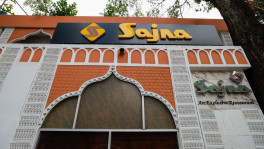Leaked data exposes China's secret 'brainwashing' camps in Xinjiang
The data leak was handed to the International Consortium of Investigative Journalists (ICIJ) by an anonymous source and shared with 17 media partners

Leaked details of the secret Chinese Government documents reveal how Muslim minorities in China's northwest Xinjiang region undergo systematic brainwashing under the strictest living conditions.
The classified blueprint of confidential documents leaked to a consortium of international journalists on November 24 shows the Chinese government's deliberate strategy to lock up minorities, most of whom are Muslims, to rewire their thoughts and even the language they speak.
The documents stipulate watch towers, double-locked doors and blanket video surveillance "to prevent escapes".
The data leak was handed to the International Consortium of Investigative Journalists (ICIJ) by an anonymous source and shared with 17 media partners.
The confidential files contradict Beijing's claim that the camps offer voluntary reeducation to hundreds of thousands of Uighur, Kazakhs and other ethnic minorities to prevent radicalization.
Another of the leaked bulletins, the Integrated Joint Operation Platform (IJOP) records the cases involving the 23 Australian citizens among the 75 foreign passport holders.
These 23 are in addition to another 15 adults and six children from the Australian Uyghur community who are being detained in Xinjiang, according to Adelaide-based Uyghur activist Nurgul Sawat.
While the fate of the Australians is unknown, the confidential report instructs public security officials to deport or detain those foreign passport holders for whom "suspected terrorism cannot be ruled out".
The documents describe an elaborate scoring system that grades detainees on how well they speak the dominant Mandarin language, memorize ideology and adhere to strict rules on everything down to bathing and using the toilet.
They also show how Beijing is pioneering a new form of social control using data and artificial intelligence.
With the help of mass surveillance technology, computers issued the names of tens of thousands of people for interrogation or detention in just one week, including university students and party officials who would not need vocational training.
Taken as a whole, the documents spell out a vast system that targets, surveys and grades entire ethnicities to forcibly assimilate them – especially Uighurs, a Turkic minority of about 10 million with its own language and culture.
Since 2017, more than a million members of the province's Muslim minorities have been rounded up and detained in a network of "vocational training" camps spread over the region in China's far west.
Most of the detainees come from Xinjiang's Uyghur community, a 10-million-strong ethnic minority of Turkic Muslims who are being collectively punished by Beijing over a series of terrorist incidents carried out by radicals.
Olsi Jazexhi is a Canadian-Albanian historian and Islamic scholar who visited Xinjiang in August as a guest of the Chinese Government. He was sceptical of reports in Western media about the crackdown and wanted to see for himself, ABC News reports.
But his preconceptions were very quickly swept away by what he witnessed at a show camp situated in Aksu district, bordering Kyrgyzstan.
"This vocational training centre, or what we call concentration camp, was a kind of Alcatraz prison in the middle of the desert," he said.
And he was under no illusions about what it was he was witnessing.
"What the Chinese are doing in Xinjiang at this moment is … a mass cultural genocide," he said.

Blueprint for internment 'brainwashing' program
Most of the documents are marked "secret" — the second-highest tier in China's security classification system — and relate to Xinjiang's vast archipelago of so-called "training and education" camps.
They include "Daily Essentials Bulletins", which provide a never-before-seen glimpse inside the insidious bureaucracy of mass surveillance in Xinjiang.
Issued by the Chinese Communist Party's Xinjiang party committee, the bulletins describe an all-seeing data management system called the Integrated Joint Operation Platform (IJOP), which is the heart of the region's security apparatus.
The documents reveal IJOP has become a Minority Report-style of intelligence gathering that enables authorities to predictively identify those suspected of harbouring extremist views and criminal intent.
One bulletin published on June 25 2017, describes how the IJOP system detected about 24,412 "suspicious" persons in southern Xinjiang during the previous week.
Of those people, 15,683 were sent to "education and training" — a euphemism for the camps — and 706 were "criminally detained".
While the grounds for suspicion are not spelled out, a Xinjiang police notice published in 2014 listed 75 indicators of "religious extremist". These included:
- Owning a compass
- Abstaining from alcohol
- Wailing, publicly grieving or otherwise acting sad when your parents die
- Not letting officials scan your irises
- Telling others not to swear
- Not allowing officials to sleep in your bed, eat your food and live in your house
- Being related to anyone who has done any of the above
- Holding a foreign passport is also grounds for suspicion, said Hong Kong-based academic and specialist in Uyghur nationalism studies Shih Chien Yu.
According to the document, detainees are placed into one of three "management areas" — similar to the minimum, medium or maximum classifications of western jails — when they arrive at the camp, correlating to the level of re-education required to normalise their behaviour.
Camp authorities then use a points-based behaviour-control system, which provides a means to assess the "ideological transformation, study and training, and compliance with discipline".
The document states that detainees must meet six conditions before being released, including:
- Attaining a high score in the points-based system
- Completing at least a year of detention
- Being assigned to the minimum security "management area"
"The vocational training centres, as the state refers to them now, are not schools in a regular sense at all," said Darren Byler, a researcher at the University of Colorado who specialises in Uyghur affairs.
"They in almost every case use barbed wire or razor wire. They're controlled as a prison would be controlled. People are not permitted to leave."
Main revelations of the papers
The documents, mostly from 2017, reveal the blueprint for how, in the wake of bloody race riots and terrorist attacks in Xinjiang a decade ago, China's ruling Communist Party set up a system of high-security internment camps that have since housed more than a million people.
The ICIJ described the papers as an "operations manual" for running the camps and detailed an Orwellian system of mass surveillance and "predictive policing," in Uighur communities and among other minority groups.
The consortium said China had undertaken the largest mass internment of a minority since the Holocaust.
The main revelations from the leaked documents includes-
- Camps are forced ideological and behavioral reeducation centers, run in secret to rewire inmates' thinking. Vocational training is only conducted in separate facilities after the prisoners' release.
- Prison authorities have been ordered to "prevent escapes" by installing guard towers, double-locked doors, alarms, blanket video surveillance and front gate security.
- The camps are linked to wider mass surveillance infrastructure across Xinjiang where a centralized data system, utilizing artificial intelligence, identifies targets for questioning and potential detention.
- Details are provided on how to maintain total secrecy about the camps' existence, methods of forced indoctrination and how to control disease outbreaks.
- Detainees are scored on their use of Mandarin and their adherence to the camp's strict rules that govern everything from where they eat, carry out chores, study or even go to the toilet.
- Detainees must remain in the centers for a minimum of a year and can be held for an indefinite period.
- "Students" are encouraged to truly transform, and the promotion of "repentance and confession" is also called for.
The documents were issued to rank-and-file officials by the powerful Xinjiang Communist Party Political and Legal Affairs Commission, the region's top authority overseeing police, courts and state security.
One document revealed that in June 2017 alone, out of 24,612 "suspicious persons" identified by the data system, 15,683 went for "education and training" 706 to prison and 2,096 were placed under house arrest.

"The systematic ways is surveillance."
Nurmuhammad Majid, president of the East Turkistan Australian Association, confirmed the view among Uyghurs that online apps such as messaging platform WeChat have played an important role in monitoring the ethnic group.
"All these popular apps are helping the Government to collect our information," he said.
Another document stresses how officials must closely scrutinize the relationships of Uighur inmates, and those interrogated should be pushed to report the names of friends and relatives. Trainers are also told to pay attention to any "ideological problems and emotional changes that arise after family communications.''
The ICIJ said the documents were verified by examining state media reports and public notices from the time. Several experts and former camp employees and detainees also confirmed the contents.
China rejects revelations
Beijing, however, immediately denounced Sunday's leak as "fabricated."
"Since the measures have been taken, there's [been] no single terrorist incident in the past three years. Xinjiang is much safer. '' the Chinese Embassy in London said, in a written response.
The statement added that religious freedom and the personal freedom of detainees were "fully respected."
Xinjiang has long been a conflict-plagued region of China. The Uighurs, the region's largest ethnic group, have repeatedly rebelled against Beijing rule — sometimes using force.
In 2009, an uprising in the regional capital, Urumqi, cost around 200 lives. In 2014, Uighur separatists carried out a knife and machete attack at a train station in the southern Chinese city of Kunming that killed 29.
China considers the violence to be in line with Islamist attacks in the West, and says extremists are fomenting unrest between its Uighur minority and the Han majority.


 Keep updated, follow The Business Standard's Google news channel
Keep updated, follow The Business Standard's Google news channel
















